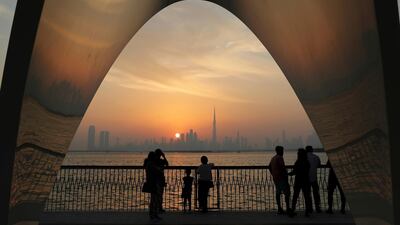The UAE could save as much as $3 billion (Dh11bn) by implementing blockchain technology, according to a joint study by the Centre for the Fourth Industrial Revolution UAE, Dubai Future Foundation and the World Economic Forum.
Blockchain, a digital record-keeper secured using unique ‘fingerprints’, promises to have far-reaching implications for global trade and supply chains. Since 2016, the UAE government has been rolling out initiatives to harness the technology’s potential as a part of its digital transformation efforts. On the federal level, the UAE is aiming to have half of all government transactions conducted using blockchain by 2021. Already 80 per cent of public and private sector entities are using the technology, according to the report.
“These insights will help us develop the correct governance for blockchain, based on the specific needs from those deploying the technology,” Khalfan Belhoul, chief executive of the Dubai Future Foundation, said.
The cost savings, realised through greater operational efficiency, will also eliminate 398 million printed documents and 77 million work hours per year by relying on blockchain to process routine transactions.
Furthermore, as part of its efforts to analyse the local blockchain landscape, the Centre for the Fourth Industrial Revolution UAE surveyed more than 60 governmental and non-governmental entities across the country that are actively exploring or implementing blockchain. The purpose of the survey was to understand the current deployment phases in the ecosystem and the relevant challenges and key success factors associated with it.
A survey by the Centre for the Fourth Industrial Revolution UAE of people working in 60 UAE entities, both governmental and private sector, found that the public sector considers education the biggest hurdle to blockchain implementation, while the private sector’s chief concern is regulatory uncertainty. Technical factors for using blockchain were not a concern to those surveyed, the Centre found.
“The [Centre for the Fourth Industrial Revolution] UAE stems from a long-standing collaboration between the UAE and the World Economic Forum,” said Mirek Dusek, head of Middle East and North Africa, at the World Economic Forum. “The principles developed in the report will empower not only UAE’s and the region’s business and government entities, but will also drive meaningful collaborations with other countries that are part of the World Economic Forum’s Fourth Industrial Revolution Network.”
The Fourth Industrial Revolution refers to a new era in which technologies are quickly emerging and affecting the way we work and live in new and unanticipated ways.


